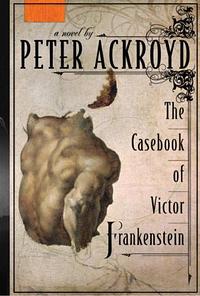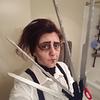Take a photo of a barcode or cover
A dark, intense novel (more for adults). Infinitely interesting, even if you haven't read the original story, but even more fun if you have. This is not a cheerful-pick-me-up book, but it is a good one. Highly recommended.
This is another "rewrite" of Frankenstein that I found out about after hearing that it had been optioned to be made into a film. Like any and all things related to Shelley's classic, I rushed out and found a copy; I'm glad to say that I found it in hardback, making the cover art absolutely stunning and the page quality top-notch. The writing is, of course, beautiful and well done, but the story itself left me with quite a few questions. Not that the plot is unfinished, or has undone tangents; simply the whole idea of it made me curious as to how it came about.
Of course ,Victor Frankenstein is our main character, as always, and this book tells his story (as per usual) from his first person point of view. We are first introduced to him when he's in school at Oxford, studying the human body to divine its secrets, even when the professors frown on these kind of shenanigans. More that needs to be known? They scoff, believing that God has already told them all they would need to know about the human form. Victor is not dissuaded from his course, and instead actually finds another companion who proves to encourage Victor's strange tendencies. This person is none other than Percy Bysshe Shelley himself, the Romantic poet that Mary Wollstonecraft Godwin (aka Mary Shelley) attached herself to.
Bysshe, as he insists Victor name him, is a volatile and manic fellow who throws his lot in with activists, always feeling that he is able to speak his mind in any group. Victor doesn't necessarily follow his lead, but becomes a member of Bysshe's entourage for the short time Bysshe is at Oxford. Victor's story follows the usual course - he becomes so enamored of the idea of creating life that he eventually researches galvanism and other forms of electrical inquiry, all toward the idea of reversing death. His experiments eventually work, but the creature (the only name for the thing) is so hideous and brutish that Victor relinquishes all ownership due to a creator.
The creature, of course, doesn't take kindly to being rejected so utterly, and thus a battle of wills is formed. It's simply not the battle of wills that one is used to - I certainly suspected something was amiss when the creature knew more than it should have, and the ending has a twist that I frankly did not see coming. This sort of story would certainly be wonderful to see in a thematic format, if it ever gets made; but my question was why did it seem necessary to introduce Percy Shelley, Lord Byron, Samuel Coleridge, John Polidori, and even eventually Mary Shelley herself into this narrative?
It's almost like that recent Dracula sequel, Dracula Undead, where Bram Stoker himself makes an appearance. It's nothing more than a gag to make readers interested; if anything, what it does, for me, is provide the theory that Mary did not necessarily come up with this story on her own, but that she based it on the life of someone she knew. Which I frankly find insulting, considering who Mary's parents were, the company she kept, and the times she lived in. I'm sure that Mr. Ackroyd did not intend to insult anyone, that he merely thought that this was a good twist on a well known story. And it is - the ending, for me, redeemed the rest of the book. It's definitely a good read, if simply to see the ending unfold. But I personally dislike this idea of introducing real literary people into fictions as though this adds something to them, when it clearly doesn't.
Of course ,Victor Frankenstein is our main character, as always, and this book tells his story (as per usual) from his first person point of view. We are first introduced to him when he's in school at Oxford, studying the human body to divine its secrets, even when the professors frown on these kind of shenanigans. More that needs to be known? They scoff, believing that God has already told them all they would need to know about the human form. Victor is not dissuaded from his course, and instead actually finds another companion who proves to encourage Victor's strange tendencies. This person is none other than Percy Bysshe Shelley himself, the Romantic poet that Mary Wollstonecraft Godwin (aka Mary Shelley) attached herself to.
Bysshe, as he insists Victor name him, is a volatile and manic fellow who throws his lot in with activists, always feeling that he is able to speak his mind in any group. Victor doesn't necessarily follow his lead, but becomes a member of Bysshe's entourage for the short time Bysshe is at Oxford. Victor's story follows the usual course - he becomes so enamored of the idea of creating life that he eventually researches galvanism and other forms of electrical inquiry, all toward the idea of reversing death. His experiments eventually work, but the creature (the only name for the thing) is so hideous and brutish that Victor relinquishes all ownership due to a creator.
The creature, of course, doesn't take kindly to being rejected so utterly, and thus a battle of wills is formed. It's simply not the battle of wills that one is used to - I certainly suspected something was amiss when the creature knew more than it should have, and the ending has a twist that I frankly did not see coming. This sort of story would certainly be wonderful to see in a thematic format, if it ever gets made; but my question was why did it seem necessary to introduce Percy Shelley, Lord Byron, Samuel Coleridge, John Polidori, and even eventually Mary Shelley herself into this narrative?
It's almost like that recent Dracula sequel, Dracula Undead, where Bram Stoker himself makes an appearance. It's nothing more than a gag to make readers interested; if anything, what it does, for me, is provide the theory that Mary did not necessarily come up with this story on her own, but that she based it on the life of someone she knew. Which I frankly find insulting, considering who Mary's parents were, the company she kept, and the times she lived in. I'm sure that Mr. Ackroyd did not intend to insult anyone, that he merely thought that this was a good twist on a well known story. And it is - the ending, for me, redeemed the rest of the book. It's definitely a good read, if simply to see the ending unfold. But I personally dislike this idea of introducing real literary people into fictions as though this adds something to them, when it clearly doesn't.
This was rather slow to start for me. That may partially be because this has been a stressful week for me, but it finally picked up about 150 pages in.
Ackroyd has a great style - I didn't feel so much like I was reading a neo-Victorian novel as I was the real thing at times. His settings and descriptions were wonderful, and the overall atmosphere of this was great.
As far as story and plot go, however, I wasn't all that impressed by this one. It has an interesting take on the tale, with Frankenstein being a friend of the Shelleys rather than merely the subject of Mary's tale (which does make an appearance, by the way), but something in the execution was lacking for me. The "twist" was obvious to me well before I got to the end, so I was disappointed by that as well.
I considered two stars, but it gets an extra one for style.
Ackroyd has a great style - I didn't feel so much like I was reading a neo-Victorian novel as I was the real thing at times. His settings and descriptions were wonderful, and the overall atmosphere of this was great.
As far as story and plot go, however, I wasn't all that impressed by this one. It has an interesting take on the tale, with Frankenstein being a friend of the Shelleys rather than merely the subject of Mary's tale (which does make an appearance, by the way), but something in the execution was lacking for me. The "twist" was obvious to me well before I got to the end, so I was disappointed by that as well.
I considered two stars, but it gets an extra one for style.
I really liked this book, but knocked off a star because it goes on for a bit too long. I never really got into Mary Shelley's version, which I read about 15 years ago, and barely managed to finish (slim volume though it was). I seem to recall that the original was written in a way that seemed very far removed from Frankenstein and his creation. This one puts you right in the middle of it all, in Frankenstein's head and in the middle of 19th century scientific experimentation. For anyone assigned the original Frankenstein as homework, I strongly encourage you to read this one along with it. It captures the essence and horror of the original, but is much more engaging and satisfying. And obviously, anyone interested in a complex, fanciful, and often disturbing re-imagining of the classic will thoroughly enjoy this.
I'm definitely going to look into some of the author's other works, especially the one on the Trojan War (one of my favorite subjects).
I'm definitely going to look into some of the author's other works, especially the one on the Trojan War (one of my favorite subjects).
One's first thought on seeing or hearing about this book is "why?" Why recreate this monster, since it's already been done before (and done in classic form). Well, I guess some author's are up for breathing new life into old things. Peter Ackroyd has done this before, re-imagining the lives of Milton and Oscar Wilde (to name a pair) in prior endeavors. Here, he shuffles Victor Frankenstein, protagonist of Mary Wollstonecraft Shelley's classic of Gothic fiction, into the life of "real" character Percy Bysshe Shelley (with appearances by Leigh Hunt, both of Shelley's wives (Harriet and Mary), Shelley's daughter, Ianthe, Lord Byron, and Dr. John Polidori). The story is well-paced, with a strong, authentic voice (that of Victor), well-drawn characters, and enough fictional/artistic license to leave the reader guessing what is coming down the pike of this here post-modern spook tale. You might see the ending coming a mile down the Thames, but that doesn't stop you from turning and turning the pages of this one. I've read a few of Ackroyd's previous works, and this is the best of the one's I have read. It is "true" to the original story in many respects, but is reshaped and written so well that it really is, for the most part, a new creature, altogether.
medium-paced
Plot or Character Driven:
Plot
Strong character development:
No
Loveable characters:
No
Diverse cast of characters:
No
Flaws of characters a main focus:
Complicated
An uninspired recitation of one of the history's greatest novels.
I am normally not one to look down on Frankenstein retellings, I LOVE Lisa Frankenstein, I LOVE Gris Grimly's graphic novel, I LOVE when contemporary artists use something as familiar as classic literature to bring something new to the story! Hell, I don't even really look down on fanfiction! If someone has something to say and we can both have fun in the process, who cares? I have a long, long list of movies and books that i've been dying to read and watch based on Mary Shelley's novel, which is why I even read this one in the first place. But it does nothing truly valuable or interesting with the source material.
The writing style itself isn't bad, but Ackroyd barely strays from the original story enough to justify this book being written. He repeats events from the book pretty much beat for beat and at the exact point of the book it would have been at in the original, despite adding a ton of stuff.
I find the inclusion of historical figures related to Mary Shelley corny. I don't think they serve any real narrative purpose outside of referencing historical figures related to Mary Shelley. I don't care about them much considering I actually despise Byron and Bysshe, but I do like John Polidori. And even though I love John Polidori, I really do not care about his inclusion in this book. As characters, I don't care about any of them. It seems like their inclusion is more to have a fun little easter egg in the book.
I don't always spend a lot of time thinking about what a book MEANS, but I couldn't really help spending the entire time I was listening to it thinking about why this book was written. I don't think books always need something deep and introspective to say. But it's Frankenstein, which is so meaningful and representative of a LOT of communities. And each community can cite different reasons as to why it works as an allegory for them specifically. I have to wonder what we're supposed to take away from this book.
I think it's supposed to be about queerness? But it's hard to tell because the book refuses to commit to making queerness an important part of the narrative. I genuinely can't even tell if I'm just reading into it and the author just seems to have weird issues with women or if we really are supposed to think this is a metaphor for repressed sexuality.
After reading other reviews, I'm leaning more towards "I'm just reading into it and the author just seems to have weird issues with women."
None of the characters are actually interesting. The most interesting thing about most of them (only the men, not the women of course) is that they were real people and they're quirky characatures of poets. I don't appreciate the sanitizing of Bysshe leaving his wife and kids for a 16 year old. I don't appreciate the idea that Mary Shelley DIDN'T actually come up with the idea for one of the greatest and most respected novels in world history AND invented an entire literary genre that is THRIVING 200 years later at 18, but instead she was writing about a guy she really met!
And again with the Godwin's maid. I don't even remember her name. Probably because she was introduced 15 minutes before she was killed off because her only purpose was to die for no reason. But she's not important to Victor. Why would the Creature/Victor kill her? To get Mary's attention? To release some sort of anger that he had been keeping bottled up? Is he just vaguely mentally ill and therefore evil?
Fred's death is the only one that's at all meaningful to Victor and to the reader because he was a real character who existed in more than one scene and he didn't even really get to die in any sort of impactful way, he simply goes missing and is never heard from again. And why Fred? If there was a Creature other than Victor it would make sense because Fred was someone close to Victor and the Creature vowed to destroy everything he loved. But there is no Creature. So why Fred? Why would Victor kill his servant who he seemed to be good friends with? Were they something more than just employer/employee or friends and Victor couldn't handle that part of himself? Did anyone ever find Fred's body? Was that actually mentioned in the book and I forgot because I just don't care about the book in general?
And of course, I have to mention the poorly contrived and horribly unoriginal twist at the end. The whole thing was in Victor's head and he was mentally ill. Even when this wasn't considered to be in poor taste, it's just lazy and meaningless. It's disrespectful to the reader and a disservice to Ackroyd's career as a writer.
So again, I have to ask: What was the point? Why was this written? What are we supposed to take away from it? Why am I supposed to care about this retelling in particular?
There are just so many other retellings of Frankenstein that actually have something to say or do something creative with the source material. This was just a waste of my time and considering it's about the same length as the original, I wish I had just reread that instead.
challenging
dark
slow-paced
Plot or Character Driven:
A mix
Strong character development:
No
Loveable characters:
No
Diverse cast of characters:
No
Flaws of characters a main focus:
Yes
challenging
dark
mysterious
tense
medium-paced
Plot or Character Driven:
A mix
Strong character development:
Complicated
Loveable characters:
No
Diverse cast of characters:
No
Flaws of characters a main focus:
Yes
The book was everything historical fiction should be and more! Peter Ackroyd does a great job keeping the story as close to the original "Frankenstein" by Mary Shelly. He just added one hell of a twist plot at the end and has historical figures of the time, Mary being one of them. A must read for any Frankenstein/1800's England lover. I can not wait to see what else Peter has done.




